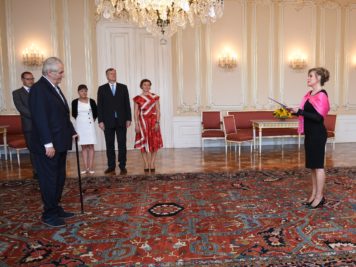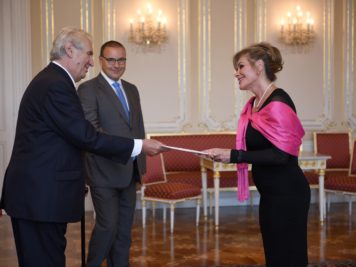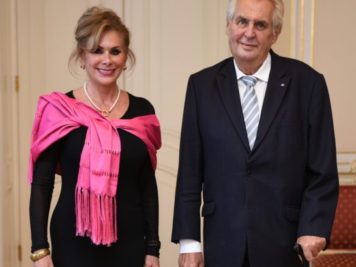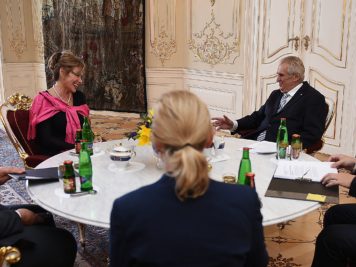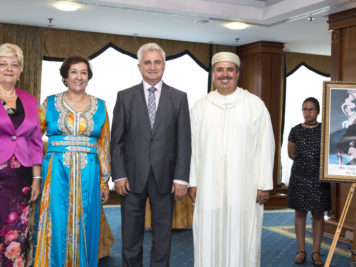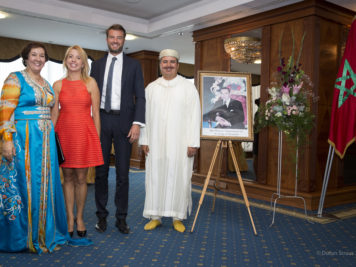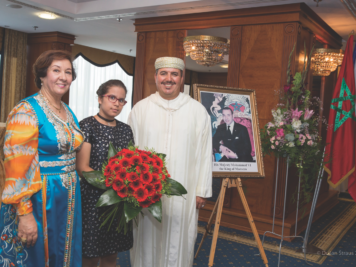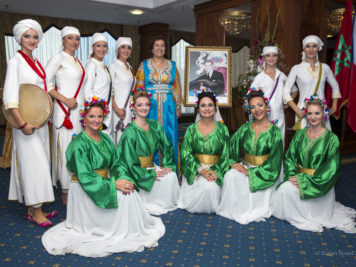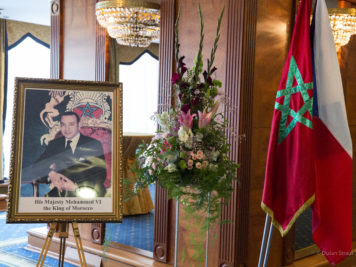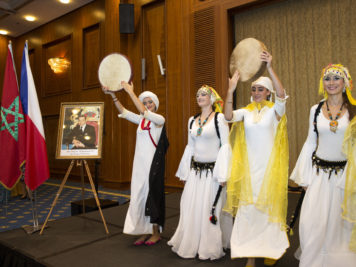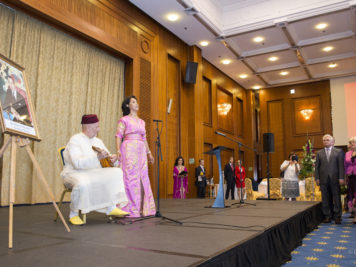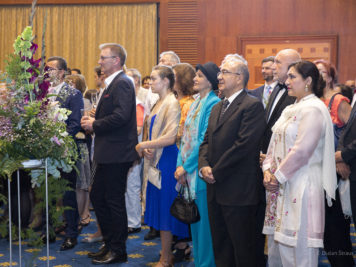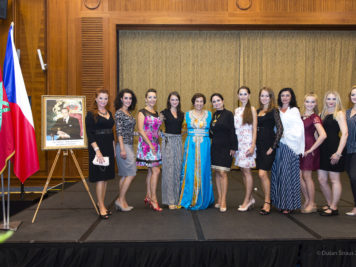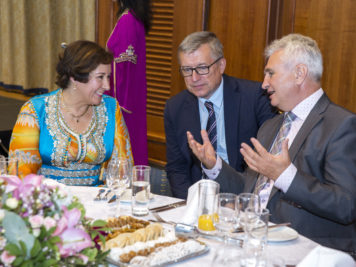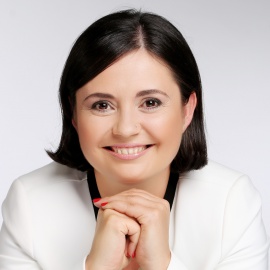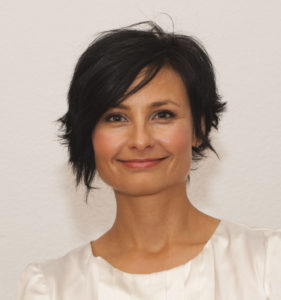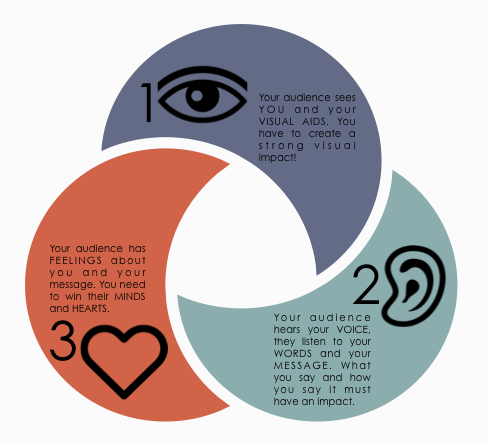“I Use My Talent for Others”

Elisabeth Lobkowicz, Princess
The life and memories of Elisabeth Lobkowicz could easily make up several volumes of a book. However, she does not consider herself to be someone special and she prefers to stay away from media attention. In the Czech Republic, she is known as the wife of Jaroslav Lobkowicz, from the Křimic branch of the family, as well as for her work as a representative of the Christie’s Auction House. Her personal story is much more complex. She is from the de Vienne family, who is related to the French royal family of Bourbon. When we met, she proudly showed me around the Middle Ages house at Sněmovní, close to the Czech Parliament and just below the Prague Castle gardens. We sat outside, the garden furniture was simple however the table was covered by a tablecloth from Provence. On the table, there were German newspapers. The European spirit of past and present was felt everywhere, underscored by the paintings of Italian and Dutch masters. We discussed not only her upbringing, the French-German reconciliation or her taste in art, but also many current issues, including united Europe and immigration as an opportunity rather than a threat.
You were raised in France, then you lived and worked in Germany and after the Velvet Revolution you and Jaroslav moved to Czechoslovakia. Where are your roots?
I grew up in France, in a noble family. Both of my parents came from the nobility, father from the North and my mother from the West. As both families had properties in Paris, I grew up in a private family house in the middle of Paris. In terms of the furniture of the apartment, it should be mentioned that it had not been bought but inherited. After the French Revolution and the Napoleonic wars, many families who left the country eventually came back and started collecting old furniture at the beginning of the 19th century. Meanwhile, our furniture and paintings came mainly from 16th -18th century, before the French Revolution. This is what I saw when I was a baby, a little girl, when one does not particularly appreciate what he sees. Because of this, I feel a connection with any piece of furniture and can immediately tell if it is an original or replica. I have difficulties understanding modern art. I stopped with the impressionists. I am happy to look at the impressionist paintings, but more contemporary pieces of art do not give me the same feeling. Had I been able to afford buying some Modern or Contemporary pieces, I would not like to have them in my home. On Sundays, we went to the mass to the Notre Dame Cathedral and then we continued to the Louvre museum. I consider these impressions from my early childhood very important. I still remember the first time I saw the Egyptian antiquities in Louvre, I was ten years old.
Your upbringing was quite unique, one would not guess that it happened in early fifties of the last century.
We were a very close family, I was the eldest of four children. We went to Catholic private schools. On my way to school, I had to pass the Soviet embassy. I remember that we had a young Polish girl as a servant. She woke me up one day and she said, “Stalin is dead.” I asked her who Stalin was and she explained the Polish experience with Stalin. So, besides art, I started to be confronted with high politics. Whenever we were passing the Embassy together, she being Polish and afraid of the Soviets, would cross the road and walk on the other side. My mother remembered that after the Germans occupied Paris during World War II, they came to the Soviet Embassy and searched the garden, finding many corpses there. Another World War II story was linked to the place where my family had a castle, about 100 kilometres south of Paris. In a neighboring village, the French resistance killed two German soldiers. The next day, the Germans marched into the village and demanded 20 people. They took them and shot them immediately. A similar thing also happened at another property in Normandy. Of course, we did not have a complete overview of the occupation, but from all the incidents I knew, it was awful and it influenced the atmosphere I grew up in. Such stories were an integral part of my upbringing.
How did the French-German reconciliation, which today serves as an example in history textbooks, happen?
In 1954, my parents made the decision to take a German au-pair, as a way to reconcile with the Germans. The first German girl came to our house when I was seven years old. Prior to the German au-pair coming, I was warned by my mother not to talk with her about World War II. She said, “we want to forget it and we want to reconcile with young people.” I grew up with the idea that Europe had to be built on reconciliation and forgiveness. My parents also started to speak German to me but at that time it had little success, as I admit to being quite lazy. When I was 16 years old, I myself was sent as an au-pair to the woman who previously came to our house. She tried to be as nice to me as my parents had been to her. To me, it was a dream. I fell in love with Germany and German culture at that time.
You support both Germany and united Europe. Such attitude has become rather rare.
Based on my upbringing, I believe in Europe from a Christian perspective, based on values of reconciliation and pardon. I follow the latest developments in Europe and I am afraid that is has become a question of interests, economy, and I am missing these Christian values. If you do not know who you are and where you are, it is becoming problematic particularly in regard to growing Muslim communities. Xenophobia is the worst thing I can imagine. We must find ways to counter that. We must make others happy in our society as it is with our values. Again, my experience of being an adolescent in 1960s can serve as an example. At that time, I saw the birth of pop-culture. Growing up in the 1960s, coming from a strong family, I did not like it. I did not consider it Christian culture anymore. I only liked the music of that period. Coming back to your question about roots, the young terrorists have no roots these days. On one hand, they want to be a part of a new culture, on the other hand they hate it. They are in the middle and thus very easy to manipulate. I am not despairing, I am very curious about the current situation. Immigration can be a huge opportunity. Currently, it is going the wrong way, but we are still in the middle of a journey. We see that terrorism is growing and so far, we lack the means to counter it. Have we looked at the perspectives we are offering to these young people?
What exactly went wrong in the development of Europe?
I believe that Europe made the wrong turn in the sixties. As nobility is closely related all over Europe, I remember being invited to Switzerland and there meeting some German second cousins who invited me to Bavaria. I went there in 1967 for the first time and the church was full. The religion was the religion of the people. I went to a very famous pilgrimage and we could not fit into the chapel as it was so full. I visited the place 15 years ago and since then I have been coming every year and it is empty. Do you know who and what replaced the place of pilgrimage? Russians who brought their money and built their villas in the middle of nowhere.
They even placed a statue of the Bull of Wall Street in one little square. It reminds me of the famous story from the Bible when people were dancing around the golden calf. Isn’t it frightening? The place that served as a place for pilgrimage until 1960s? Instead, there is a huge casino. These people believe only in money, not eternal life. The cult of the Virgin Mary was replaced by a cult of money.
It was in Bavaria, where you met your husband, Jaroslav Lobkowicz.
Yes, it was in 1968. I was invited to a ball and I noticed a young man standing in a corner who did not know anybody. I approached him to find out that he was from Czechoslovakia.
He was the first Czechoslovakian that I saw in my life and I am still seeing him today. The only thing I knew about Czechoslovakia was that it was behind the Iron Curtain.
Let me again refer to the history textbooks, as we were taught about the special Czechoslovak-French relationship during the First Czechoslovak Republic, the Little Entente agreement or the close ties of the Czech and French artists…Nothing lasted until 1960s?
None of these things were on my mind. However, I told you that I am extremely curious. I interviewed him to find out more about him and his fate and at the end he fell in love with me. Well, you know, it might be quite dangerous to give an interview. (laugh)
You two met in July 1968…The spring of that year was special not only for Czechoslovakia, but also for France.
Jaroslav mentioned at that time that he made his living repairing TV sets and that he had to return back to his country, as his clients were waiting for him. Of course, we discussed the events of Prague spring and we compared it to Paris spring. That year, many people in Paris were literally prepared to die, as we did not know whether the Americans would stick to their military engagement as the French president de Gaulle left NATO. The revolution in Paris broke out and at that time the French communist party was very strong, they got 30% of the vote in the election. There was a huge demonstration at the Place de la Concorde, close to our home and we felt it was our duty to go to the demonstration. Everybody was watching us. So we went. The whole family. As de Gaulle left the country, we thought the demonstration was the last chance and we participated knowing that we could be shot, if the Soviets decided to intervene. The French communists still had weapons, so it was truly dangerous. The surprise was that one million Parisians thought the same. Place de la Concorde full, Champs Elyséés full…Luckily, the tanks were secured by the government. Eventually, de Gaulle came back and we held a new election where de Gaulle got 80% of vote.
Jaroslav was in love, but what about you?
He returned to Czechoslovakia in July and then he left the country two days after the invasion. At that time it was still easy to cross the boarders. Even though Jaroslav was invited to live with his nobleman uncle, he did not want to just sit at the castle. So his uncle opened newspapers and found my future husband a job– he started to work in a factory next to Turks and other immigrants. He never asked for political asylum. He said that he did not want to get money from Germany and he did not want to be dependent on the decision of a civil servant. After three months, he earned enough money to attend the German language course which eventually enabled him to get a scholarship and start studying at the university. In Czechoslovakia, as a member of Lobkowicz family, he could not stud. He went to school Monday to Friday and on Saturdays he kept repairing televisions. After university, he started his great career at Siemens, working at the research and development department. We had three children, we spoke German at home and we had many friends. We felt truly at home in Germany.
Let us fast forward more than twenty years, when you returned to Czechoslovakia in 1993.
I must say that I visited Czechoslovakia during communist times to visit my husband’s parents. Since 1971, I was visiting Czechoslovakia regularly. I remember how dark driving to Plzen was, it felt like entering a military zone. My father in law had been subjected to many difficult and painful interrogations by the secret police, but it didn’t change him, he was very nice and kind. My impression at that time was that if the Iron Curtain did fall down, everything was so devastated that it would be almost impossible to repair it. I am so glad to have been wrong about that and I am so happy to see how well the Czech Republic is doing. The Czechs made it. Compared to East Germany, they did not have billions of Euros from outside but they have made it.
By Linda Štucbartová
The Křimice castle in Plzeň is currently undergoing restoration under the management of Vladimír Lobkowicz, the eldest son of Jaroslav Lobkowicz. Visit it to learn not only about baroque history, but also about contemporary events, when the castles were ruined and turned into boarding schools, agricultural cooperatives or warehouses. When the castle was returned to the Lobkowicz family, almost all of its 130 windows were broken, and it’s a structural integrity damaged. The park had turned into a jungle. Now, the entire complex is open for the public and being used for cultural events, serving various age groups from children to seniors.



